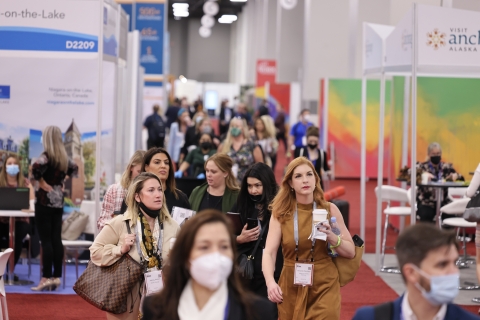Meetings Mean Business Fully Integrates With U.S. Travel to Bolster Industry’s Voice and Recovery

In another move aimed at boosting the industry’s recovery through the full return of in-person professional meetings and events, the Meetings Mean Business Coalition (MMBC) and the U.S. Travel Association announced the full integration of the coalition under the U.S. Travel umbrella.
With the assimilation, MMBC will strengthen its critical mission of uniting the meetings and events industry with one strong and powerful voice. The coalition will benefit more directly from U.S. Travel’s robust public affairs resources and advocacy network while providing greater value to coalition members as the business travel and professional meetings and events industries rebuild from steep pandemic-related losses.
With the help of industry partners, Roger Dow, president and CEO of U.S. Travel, headed the effort to create the MMBC in 2009, which has continued to aggressively promote and defend the value of face-to-face business meetings, trade shows, conferences and conventions.
“Since its founding, the Meetings Mean Business Coalition and the U.S. Travel Association have been close partners in producing meaningful programs that highlight the value of meetings and business travel events,” said Michael Massari, chief sales officer of Caesars Entertainment and co-chair of MMBC. “Taking this next step to integrate resources will further elevate our collective work as we emerge stronger than ever from the pandemic.”
Fred Dixon, president and CEO of NYC & Company and co-chair of MMBC, echoed that sentiment.
“Fully integrating Meetings Mean Business and its scope of work under the U.S. Travel Association umbrella makes great strategic sense, given the level of need and advocacy for the recovery of the meetings and business events travel segment,” Dixon said. “We are excited to closely align the coalition’s work further within U.S. Travel and its public affairs program.”
The return of professional meetings and events is vital to the recovery of the travel economy and is a top priority of the association, along with rebuilding international inbound travel and the growth of domestic leisure travel, according to Dow.
“Meeting and business events—in conjunction with international inbound and domestic leisure travel—is one of the three critical segments of the U.S. travel economy,” Dow said. “The overall recovery of the industry relies, in part, on the swift return of professional meetings and events.”
According to U.S. Travel, in 2019, nearly 500 million business trips were taken in the U.S, with $306 billion spent on travel-related goods that supported 2.5 million American jobs. Despite making up just 20% of total trip volume pre-pandemic, business travelers accounted for a disproportionate 40-60% of lodging and air revenue.
Pandemic-related losses in business travel spending in 2020 and 2021 is estimated at $315 billion.
U.S. Travel’s latest forecast projects that domestic business travel spending will reach 76% of 2019 levels in 2022 while the segment is not expected to fully recover until 2024. International business travel spending is projected to reach 65% of 2019 levels in 2022 and fully recover around 2025. The association is advocating for a set of policies to accelerate the industry’s recovery, including the following:
- Congress should enact temporary tax credits to venues, event organizers and/or small businesses to help cover the cost of running or participating in an in-person business meeting or event that meets certain safety criteria, such as proposed in Section 2 of the Hospitality and Commerce Job Recovery Act.
- Congress should enact government-sponsored event cancellation insurance coverage for pandemic-related losses, such as proposed in the Pandemic Risk Insurance Act of 2021. Businesses and organizations need pandemic risk insurance to gain the certainty they need to fully re-engage in hosting and registering for in-person meetings and events.
- Congress should provide new targeted relief grants to small travel businesses that experienced significant revenue loss in 2021 compared to 2019. Relief grants should be provided through expanded eligibility for the Restaurant Revitalization Fund (RRF), the Shuttered Venue Operators Grant Program, or a new relief program with a similar structure to RRF. Eligible travel businesses should include hotels, restaurants, tour operators, meeting and event planners and venues, tour operators, attractions, and similar businesses that have been impacted by travel restrictions, capacity limitations or other COVID-related policies.
The MMBC integration with U.S. Travel, formalized during a meeting at IMEX America 2021 in Las Vegas Nov. 9-11, comes following three other positive developments and initiatives that have recently taken shape: the opening of U.S. borders to fully vaccinated international travelers Nov. 8; a September gathering of industry officials in Washington, D.C. to make a compelling case for the full and safe return of in-person professional meetings and events; and the launch in June of the Let’s Meet There campaign, spearheaded under the U.S. Travel umbrella by an alliance of industry associations and coalitions, including MMBC.
Global Meetings Industry Day, a signature program of the MMBC that celebrates the value of professional meetings and events, will take place on April 7, 2022.
Photo: IMEX America 2021 show floor on day 1.
Don’t miss any event-related news: Sign up for our weekly e-newsletter HERE and engage with us on Twitter, Facebook and LinkedIn!


Add new comment